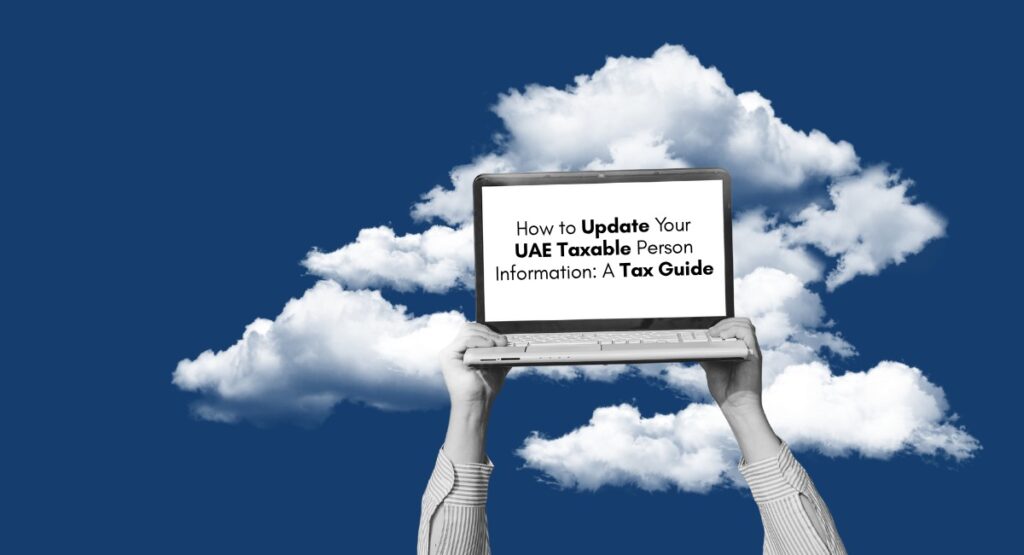How to Update Your UAE Taxable Person Information: A Tax Guide

Running a business setup in the UAE, whether you’re tucked into a buzzing free zone or spread across the mainland, comes with a long list of responsibilities. And one thing you don’t want to ignore? Keeping your taxable person details updated on the EmaraTax portal. It’s not just a best practice. It’s the law. According to Cabinet Decision No. 74 of 2023, businesses must notify the Federal Tax Authority (FTA) of any changes to their taxable person details within 20 business days. Failure to comply may result in administrative penalties.
Let’s walk through what you need to know, step-by-step.
Table of Contents
Toggle1. What You Can (and Should) Update
Before you even think of hitting “submit,” let’s talk about what you’re allowed to update on the EmaraTax portal, and what proof you’ll need to get those changes through without a hitch. Some changes are simple, others are a bit more paperwork-heavy, but here’s the breakdown:
- Trade name / Business name
Changed your business name recently? You’ll need to upload your updated trade licence and the amended Articles of Association. - Ownership structure
Switched up your shareholders? Prepare an updated licence and a shareholder agreement or partnership deed to reflect that new ownership arrangement. - Registered address
If you’ve moved offices, the FTA wants proof. You’ll need your new lease agreement, tenancy contract, or a valid title deed to update your registered address. - Business activity
Added or removed business activities? You’ll need a revised business licence that clearly mentions the updated activities. - Legal form changes
Changed your legal structure (say from LLC to Sole Establishment)? The system requires your updated MOA and company formation documents. - New or removed authorised signatories
Bringing new names on board or removing others? You’ll need to submit their Emirates ID or passport, along with a board resolution or official letter. - Contact details
New phone number? Updated email? These can be easily changed, just make sure they’re verified before submitting. - Optional stuff
You may also update optional fields such as your bank account number, customs codes, and import/export details. While these are not mandatory unless they impact your tax records, keeping them aligned can support smooth compliance.
2. Why You Don’t Want to Slack on This

Let’s be real, no one likes admin work. But this isn’t just another box to tick. Failing to update your details on time can trigger penalties, mess up your filings, and create chaos in areas you didn’t even think of. So, yes, it matters.
- VAT/Excise Penalties
According to FTA guidelines, failure to update VAT or Excise Tax registration information can lead to an AED 5,000 fine for the first offense, and increased penalties for repeated violations. - Corporate Tax Penalties
For Corporate Tax, an initial failure to update your information can result in a fine of AED 1,000, increasing to AED 5,000 for subsequent violations within 24 months, as per FTA administrative penalty rules. - Reputational & Operational Risks
Outdated or inconsistent records can lead to missed FTA notifications, incorrect tax filings, audit complications, and even disruptions in processes like ICV certification or external financial audits. It could even throw a wrench into your accounting, CFO services, and ICV certification plans.
3. The Grace Period is Real, But It’s Also Temporary
The FTA has offered businesses a bit of breathing room. The FTA has announced a grace period from January 1, 2024, to March 31, 2025, allowing businesses to amend incorrect or outdated taxable person information without incurring penalties. Sounds good, right? It is, but it’s not permanent.
- Don’t Wait Until the Last Minute
This is your chance to fix everything in one go and no late fees. But don’t get too comfortable. Come April 2025, the grace period ends and penalties kick in again. You’ve been warned.
4. Step-by-Step: How to Make Updates on EmaraTax

Okay, ready to actually make those updates? It’s easier than you might think, as long as you’ve got the right docs and a few minutes of focus. Here’s how to do it:
- Login to EmaraTax
Use your UAE Pass or your EmaraTax credentials. Expect a two-factor authentication (OTP) for extra security. - Select the Taxable Person Profile
Choose whether you’re editing your VAT or Corporate Tax profile. - Click “Amendment”
You’ll usually find this under the “Actions” menu. - Review Instructions
The FTA gives guidance on what to upload and where. Don’t skip this part. - Enable Editing
Check the boxes for the sections you need to edit, then proceed. - Upload Supporting Documents
File formats can be .pdf, .jpg, or .png, and each file must be under 5 MB. - Submit or Save as Draft
If everything’s ready, submit. If not, save your progress and come back. - Track Your Status
Your request will move through stages: In Review, Awaiting Info, Approved, or Rejected. - Download Updated Certificates
Once approved, grab your new VAT and Corporate Tax certificates from the portal.
5. Corporate Tax & What’s Changing in 2025
Corporate Tax isn’t new anymore, but there’s more coming. Starting in 2024, UAE businesses have been paying 9% on profits over AED 375,000. But big changes are around the corner.
- DMTT Is Coming
Effective January 2025, under the UAE’s implementation of the OECD’s Pillar Two rules, large multinational entities with global revenues exceeding €750 million will be subject to a 15% Domestic Minimum Top-Up Tax (DMTT). If you’re in this league, the compliance bar just got higher. - Incentives (Hopefully) On the Way
There have been preliminary discussions around introducing tax incentives, such as credits for research and development or job creation. However, no official announcements have been made as of now. Stay updated via the Ministry of Finance and FTA portals. Keep your eyes on FTA and Ministry of Finance announcements.
6. Why Accuracy Isn’t Just “Nice”, it’s Strategic

Think of your EmaraTax profile as the foundation of your compliance. If it’s shaky, everything built on it, your filings, certifications, evaluations can fall apart.
- Smoother VAT Returns
Clean records help you avoid errors and revisions. - Better Consultant Support
Your accounting service, CFOs, and accountants can only help you if they’re working with accurate data. - Essential for Certifications and Audits
Planning a company liquidation? ICV certification? Business evaluation? Everything needs verified, up-to-date documentation. - Banking & Port Approvals
Whether you’re in a free-zone or mainland, accurate data is key to opening bank accounts and coordinating port clearance.
7. Expert Tips to Get It Right the First Time
Want to avoid resubmissions, confusion, or last-minute freakouts? Here are a few pro tips straight from consultants who’ve seen it all:
- Start Early
Don’t wait until March 30 to start making updates. Give yourself time. - Scan Clearly
Ensure all uploaded documents are clear, legible, and aligned with the details in your application. Submitting poor-quality scans may delay the approval process. - Back Up Everything
Keep copies of every file you upload, just in case FTA wants more info later. - Stay Updated
FTA often sends out notices and reminders. Keep an eye on them, even if they’re buried in your inbox. - Consult a Professional for Complex Cases
Restructuring ownership, setting up trusts, or dealing with inter-entity transfers? Bring in a pro. You’ll save time, money, and a whole lot of stress. - Make It Part of Your Routine
Tie your tax updates into your regular CFO and accounting workflows, especially before year-end filings.
8. Final Thoughts
In the fast-moving world of UAE tax reforms, staying ahead of the curve can save you time, money, and a bunch of headaches. Whether it’s VAT, Corporate Tax, or upcoming OECD-aligned reforms, accurate records are your ticket to smooth operations.
So, don’t wait for an audit to clean up your details. Use the grace period wisely. After March 31, 2025, the penalties will hurt, and worse, they’re avoidable. Whether you’re running a startup, managing a free-zone company, or advising a group of entities, now’s the time to get compliant.
And if you’re overwhelmed? You don’t have to go it alone. If you need assistance with document preparation, resubmissions, or FTA compliance, consider working with certified tax consultants or registered FTA agents to ensure accuracy and peace of mind.
Let’s make compliance easy, today and in the long run.
Disclaimer:
The information shared in this blog is for general awareness only. It does not constitute legal, tax, or business advice. Regulations in the UAE, particularly those concerning taxation, cyber law, and corporate structuring, may change over time. For personalized guidance, always consult licensed professionals or refer to official portals like the Federal Tax Authority (FTA) or your local DED. No liability is accepted for actions taken based on this content.
Source:
Federal Tax Authority
Ministry of Finance UAE
OECD Pillar Two Guidelines
FTA Cabinet Decision 74 of 2023 PDF
EmaraTax portal
According to Cabinet Decision No. 74 of 2023
FAQ
1. How to update tax records in UAE?
Updating your tax records in the UAE is now simpler than ever, thanks to the EmaraTax portal. Whether it’s a new trade name, a change in shareholders, or an updated office address, all you need to do is log in, select your profile, and upload the right supporting documents. Just make sure everything you submit is clear, up-to-date, and matches your official records to avoid delays.
2. What are the steps to update taxable person information in the UAE?
It’s a straightforward process. Here’s how it works:
- Log in to EmaraTax using UAE Pass or your FTA credentials.
- Choose your taxable profile (VAT or Corporate Tax).
- Click on “Amendment” from the Actions menu.
- Select the sections you want to update.
- Upload the required documents (PDF, JPG, or PNG – under 5MB each).
- Submit or save as draft.
- Track your request and download your updated certificates once approved.
Easy, right? Just keep your documents ready and double-check for accuracy before hitting submit.
3. Who is a taxable person in the UAE?
A “taxable person” is any individual, company, or legal entity registered (or required to register) with the Federal Tax Authority for VAT, Excise, or Corporate Tax. This includes businesses operating in mainland UAE or free zones. If you’re earning taxable income or meeting the thresholds set by the FTA, you’re considered a taxable person and you’re expected to keep your details accurate and updated.
4. Can I change my taxable person details online in the UAE?
Yes, absolutely. All updates to taxable person information, like business name, ownership structure, legal form, or contact info, can be done online via the EmaraTax portal. As long as you have the required documents, you won’t even need to visit any government office. Just log in, upload, and submit. Quick, secure, and all digital.
5. Why do I need to amend my taxable person details in the UAE?
Because it’s the law and skipping this step can cost you. Cabinet Decision No. 74 of 2023 requires businesses to report any changes within 20 business days. Not doing so could lead to penalties starting from AED 1,000 and going up from there. But beyond the fines, keeping your records accurate ensures smoother filings, audit readiness, and zero hiccups in getting certifications, banking approvals, or FTA alerts.
